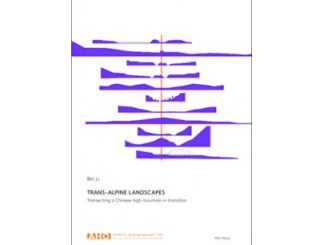
How are the changes of alpine landscapes affected by urbanization? How could a landscape-informed perspective open up other ways of reading and other strategies for adapting the urbanization to the vulnerable alpine landscapes, and how does this expand the discussion of the rapid changes of rural China?
Trans-alpine Landscapes explores the changing landscapes of a high mountain in China affected by ongoing urbanization. Mount Gongga, the highest mountain of the Hengduan mountainous regions in Southwestern China, is the main case for study. A trans-geographical exploration brings in other alpine geographies—the Swiss Alps and the Norwegian Scandes—as the comparable references. The project deploys a landscape-informed approach by revealing landscape changes, challenges and qualities on the ground through transects. The dissertation argues that landscape architects can take on the role as curators, to circle out routes and pauses that are slow and of a light footprint. The in-flux landscapes could be transformed into educational, experienced, and ephemeral spaces.

